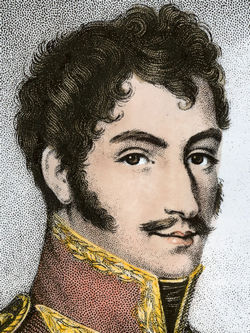
168 cm
Simón José Antonio de la Santísima Trinidad Bolívar Palacios Ponte y Blanco (24 July 1783 – 17 December 1830) was a Venezuelan statesman and military officer who led what are currently the countries of Colombia, Venezuela, Ecuador, Peru, Panama, and Bolivia to independence from the Spanish Empire. He is known colloquially as El Libertador, or the Liberator of America.
Simón Bolívar was born in Caracas in the Captaincy General of Venezuela into a wealthy family of American-born Spaniards (criollo) but lost both parents as a child. Bolívar was educated abroad and lived in Spain, as was common for men of upper-class families in his day. While living in Madrid from 1800 to 1802, he was introduced to Enlightenment philosophy and married María Teresa Rodríguez del Toro y Alaysa, who died in Venezuela from yellow fever in 1803. From 1803 to 1805, Bolívar embarked on a Grand Tour that ended in Rome, where he swore to end the Spanish rule in the Americas. In 1807, Bolívar returned to Venezuela and promoted Venezuelan independence to other wealthy creoles. When the Spanish authority in the Americas weakened due to Napoleon's Peninsular War, Bolívar became a zealous combatant and politician in the Spanish-American wars of independence.
Bolívar began his military career in 1810 as a militia officer in the Venezuelan War of Independence, fighting Royalist forces for the first and second Venezuelan republics and the United Provinces of New Granada. After Spanish forces subdued New Granada in 1815, Bolívar was forced into exile on Jamaica. In Haiti, Bolívar met and befriended Haitian revolutionary leader Alexandre Pétion. After promising to abolish slavery in Spanish America, Bolívar received military support from Pétion and returned to Venezuela. He established a third republic in 1817 and then crossed the Andes to liberate New Granada in 1819. Bolívar and his allies defeated the Spanish in New Granada in 1819, Venezuela and Panama in 1821, Ecuador in 1822, Peru in 1824, and Bolivia in 1825. Venezuela, New Granada, Ecuador, and Panama were merged into the Republic of Colombia (Gran Colombia), with Bolívar as president there and in Peru and Bolivia.
In his final years, Bolívar became increasingly disillusioned with the South American republics, and distanced from them because of his centralist ideology. He was successively removed from his offices until he resigned the presidency of Colombia and died of tuberculosis in 1830. His legacy is diverse and far-reaching within Latin America and beyond. He is regarded as a hero and national and cultural icon throughout Latin America; the nations of Bolivia and Venezuela (as the Bolivarian Republic of Venezuela) are named after him, and he has been memorialized all over the world in the form of public art or street names and in popular culture.
Source : Wikipedia